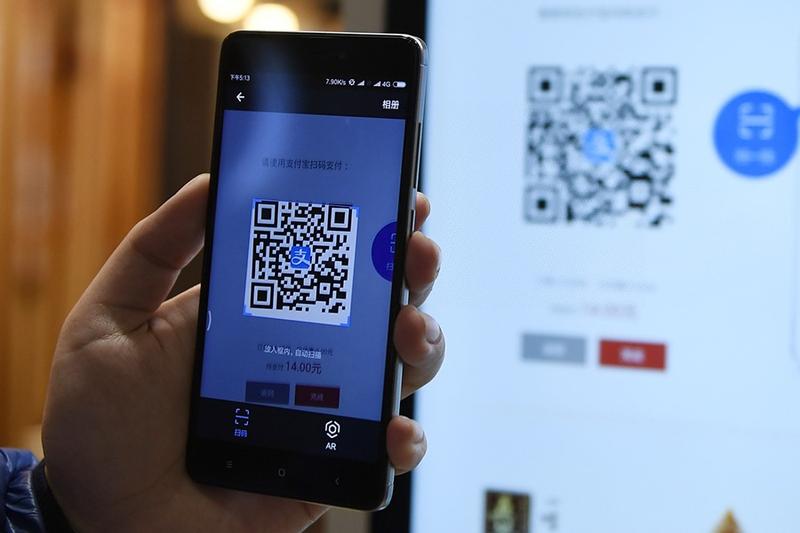 A consumer scans an Alipay QR code to pay for the order at a self-service restaurant in Hangzhou, Zhejiang province. (XINHUA)
A consumer scans an Alipay QR code to pay for the order at a self-service restaurant in Hangzhou, Zhejiang province. (XINHUA)
BEIJING / SAN FRANCISCO - A Foreign Ministry spokesperson on Wednesday condemned the US ban on transactions involving eight Chinese apps on the pretext of protecting US citizens' privacy and data security.
"This is another example of the US side stretching the concept of national security and abusing state power to groundlessly suppress foreign companies," spokesperson Hua Chunying said at a daily news briefing.
This is another example of the US side stretching the concept of national security and abusing state power to groundlessly suppress foreign companies.
Hua Chunying,
Chinese Foreign Ministry spokesperson
US President Donald Trump on Tuesday banned though an executive order Chinese apps including Alipay, WeChat Pay, CamScanner, QQ Wallet, SHAREit, Tencent QQ, VMate, and WPS Office. The executive order goes into effect in 45 days. Trump leaves office in two weeks. Hua called the US actions "hypocritical and ridiculous."
Noting that the United States has always been the world's largest "hacking empire," Hua said the United States launches groundless accusations against other countries while at the same time it monitors and steals secrets from others indiscriminately. "It's like a thief yelling that he wants to be protected from being stolen."
Hua said the US actions will have some impact on Chinese enterprises but, more importantly, they will damage the interests of the United States and its consumers.
"The United States talks about a free market economy and fair competition, but how does it behave itself?" Hua said.
She stressed that the development of science and technology should serve the progress and well-being of all mankind, rather than be treated differently by ideology or become a tool of political manipulation.
READ MORE: US firms fear losing out with app bans
China urges the United States to earnestly respect market economy and fair competition principles, abide by international economic and trade rules, and provide an open, fair, just and non-discriminatory business environment for foreign companies investing and operating in the country, said Hua, adding that China will take necessary measures to safeguard the legitimate rights and interests of Chinese enterprises.
Trump said in his order that the apps can access private information from their users. That information could be used to "track the locations of Federal employees and contractors, and build dossiers of personal information", he said.
Donald Trump said in the order that the apps can access private information from their users. That information could be used to "track the locations of Federal employees and contractors, and build dossiers of personal information", he said
The order instructs Commerce Secretary Wilbur Ross to evaluate other apps that could pose a "national security threat".
The Trump administration has targeted Chinese-owned social media applications, claiming that they pose a national security risk to the American public.
In August, Trump issued two executive orders banning TikTok, a popular video-sharing app owned by Chinese company ByteDance, and social networking app WeChat, which belongs to Tencent.
Both orders have faced legal challenges. The order banning downloads of WeChat in the US was blocked by a federal judge in September shortly after it was scheduled to take effect.
Two federal judges also separately blocked the order concerning TikTok, which would have restricted American transactions with TikTok, effectively banning the app in the US.
Thanks to the courts' ruling, both apps continue to operate in the US now. The Trump administration has sought to overturn the rulings.
Trump's latest ban on Chinese apps has drawn immediate reaction from Chinese communities in the US. At an online forum of WenxueCity, a website for Chinese living in the US, some users expressed doubt that the order would go into effect because TikTok and WeChat still operate.
"To US businesses, it's a stupid move to ban an app that allows Chinese to spend more in the US," said a user on online forum WenxueCity
"To US businesses, it's a stupid move to ban an app that allows Chinese to spend more in the US," said another user.
WeChat is not only a communications tool but also a payment service. Following the WeChat executive order issued in August, US companies that do business with China raised concerns that the ban would make them less competitive.
ALSO READ: US' WeChat ban brings cold war with China into a billion homes
Alipay, owned by Chinese financial-technology giant Ant Group, has more than 1 billion users. Alipay and WeChat Pay are the two most popular payment apps, which jointly take 90 percent of China's mobile-payment market share as the daily app of Chinese consumers.
A large number of merchants in the US have started to accept payments via Alipay, according to the company. In 2016, Alipay partnered with Uber to allow Chinese travelers to request and pay for rides from either the Uber or Alipay app.
DFS Group, a major luxury travel retailer, became the first offline retailer in the US to launch Alipay, at San Francisco International Airport in 2016.
With inputs from Xinhua


